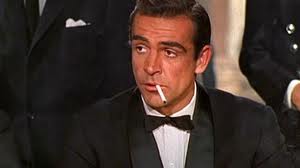“Do you expect me to talk?”
“No, Mr. Bond, I expect you to die!”
The exchange between Bond and Goldfinger may sum up the attitude of many who are tired, offended, or otherwise ambivalent or disinterested in the absurdly long career of the improbable James Bond, 007. Even those of us who have been more or less unable to let go our adolescent attachment to the character have doubtless wondered why he hasn’t just died.
He should have, certainly after the criminal treatment he endured toward the middle and end of the Roger Moore years. All due respect to Mr. Moore (he didn’t write the films, he had probably less control than most leading men), I for one never quite accepted him as Bond. He was always a bit too pretty, a bit too sophisticated, a bit too…light.
But the movies were popular, he kept signing on, and we endured, waiting for the next incarnation of Sean Connery.
The iconic Bond image of Connery with the long-barreled Walther (yes, that thing was a Walther, but it was an air gun because the actual prop hadn’t arrived for the photo shoot) which was never seen in any of the Bond films is not the one that summed up the character for me. Rather it was this one:
 The first real good look at Bond, at the L’Circle club at the beginning of Doctor No. This is the image that made me want to be Bond— utterly unconcerned, cool, detached, and completely confident within himself. He’s playing a fairly expensive game of bacarat and he obviously could care less whether he wins or loses. (Of course, this is not true—Bond always cared about that, but not over trivial things. The trivial things simple fell in line when he walked into the room, and this was another characteristic that made him, to a clumsy, hormone-laced adolescent, such an enviable figure. How badly I wanted to simply not give a damn and how thoroughly I gave a damn about not being able to do that.)
The first real good look at Bond, at the L’Circle club at the beginning of Doctor No. This is the image that made me want to be Bond— utterly unconcerned, cool, detached, and completely confident within himself. He’s playing a fairly expensive game of bacarat and he obviously could care less whether he wins or loses. (Of course, this is not true—Bond always cared about that, but not over trivial things. The trivial things simple fell in line when he walked into the room, and this was another characteristic that made him, to a clumsy, hormone-laced adolescent, such an enviable figure. How badly I wanted to simply not give a damn and how thoroughly I gave a damn about not being able to do that.)
I saw that first Bond film on first release. I was eight at the time and it wasn’t the women that got me, it was that dangerous cool he had at his disposal. Later, as I reached puberty, the women became important, but till then it was being lethal—and not using it—that was the thing.
And dressing well and talking well and comporting yourself as if you knew why you were there and what you were doing. It was a total package that was the only viable replacement for the stoic gunslinger in the westerns. In the scope of a kid’s imagination, Bond was doable.
I wrote an essay for one of the BenBella Smartpop anthologies, James Bond In The 21st Century riffing on an imaginary history of the films, with a departure from Sean Connery. It could have happened, Fleming was not taken with Connery at first, and there were others who could have filled the role. (Fleming’s choice was David Niven, which, given the physicality of the character, is kind of absurd. But it explains the subsequent choices, I think, of actors.) It was also an alternate history of the franchise had it not been the hit that it was. It was a fun piece to write, but it addressed a serious question.
Why did a franchise that became, for a time, so massively ridiculous continue to be such a big deal?
I think the answer is in the new manifestation. Daniel Craig (and the writers) has gone back to the source in many ways and given us a Bond more in line with Fleming’s original conception of someone who is genuinely dangerous who wears a veneer of polish, culture, and civilization.
 Once again, though, we harken back to that first on-screen look at Bond and see its reemergence in Craig’s portrayal. Detached, completely in control, cool, and competent.
Once again, though, we harken back to that first on-screen look at Bond and see its reemergence in Craig’s portrayal. Detached, completely in control, cool, and competent.
But with a difference for the films.
He’s vulnerable.
The last time Bond was vulnerable was in On Her Majestie’s Secret Service and Tracy Bond. After that, he was in all but the Kryptonian origin, Superman. It became the trademark. Nothing got through, not really. He had his empathy boxed up and set to one side, to be taken out on special occasions.
And there’s an appeal to that, to be sure. We have all been undone by our notoriously fickle and sabotaging emotions, made fools of, acted stupidly. What would we give to be able to avoid all that?
Well, the price is too high, but we have fantasy characters through which to pretend.
But I think it goes too far and they become so unlikely—not in their actions, the plots that give them a showcase, but in their emotional lives—that we cannot identify with them at all. All we have then are the toys, the lifestyle, the fashions, and the rollercoaster ride of an action sequence.
Craig has been allowed to open Bond up so we can reconnect, albeit in a small way, with the pathetic human being caged behind the armor. The fact that Craig is a first-rate actor (possibly better than Connery even in his prime) doesn’t hurt.
Bond has survived, though, because at his base he still represents a level of competence in a fickle, dangerous world we would all like to tap into. Bond is always centered, he always knows what he’s about and how to act on that knowledge, and that is a very attractive ideal. When you look at the first three Bond films, you can see that and a slightly vulnerable man, one who doesn’t always get it right, who can become involved, and can therefore be hurt. After Thunderball they became all about the gadgets and some surreal good vs evil drama that actually gave a good shadow-theater representation of the world at large.
The other thing that has carried us through so many really awful Bond films, though, is the myth of the uninvolved sybarite. He comes in, takes his pleasure, kills the bad guy, and leaves unscathed. He’s a moral avenger who gets to party occasionally. His reward for doing the right thing was good food, fast cars, fine clothes, and great sex. Bond never got fat, never caught a ticket or the clap, never left behind a single mom, and always looked good. In return, he saved the world. There was no sacrifice, really—he was a mercenary.
Except that’s not what Fleming wrote. And when they rebooted the franchise and chose to do Casino Royale, they put that in there. It may be ignored in subsequent films (I hope not, it’s what elevates Bond above the common), but it was there—Bond is sacrificing his soul.
That first novel, Casino Royale, was about that. Bond was a new agent, freshly-minted with a 007 license, and fully a third of the book is him in hospital, working through the emotional and moral calculus of continuing to do this ugly, brutal job. To their credit, the makers of the first Craig film kept that in. We were even, dimly, shown its conclusion in Quantum of Solace, where at the end Bond has made his choice, and put on the armor.
It will be interesting to see if they continue to keep him human, if only slightly, or if they’ll do what they did before and turn him into the Road Runner getting one over on all the coyotes on the planet.
Happy birthday, Mr. Bond.






